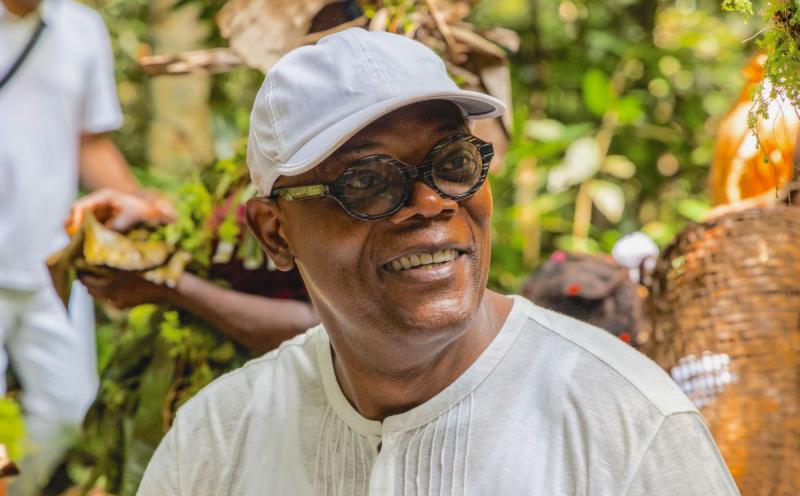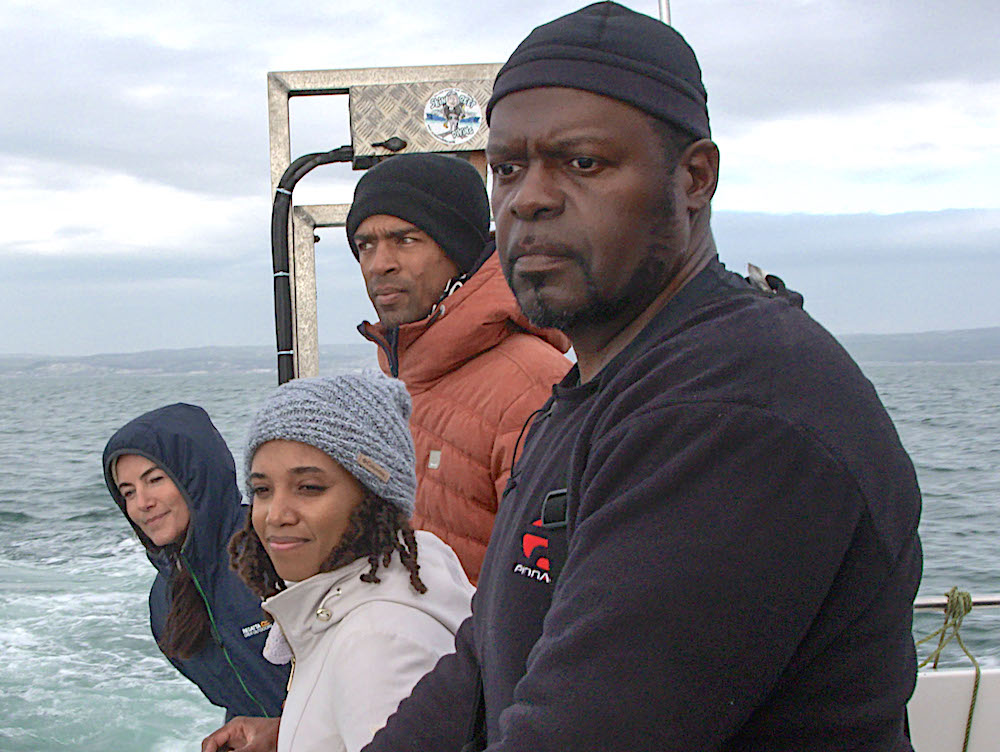Enslaved with Samuel L Jackson, BBC Two review - ambitious history of the slave trade falls short | reviews, news & interviews
Enslaved with Samuel L Jackson, BBC Two review - ambitious history of the slave trade falls short
Enslaved with Samuel L Jackson, BBC Two review - ambitious history of the slave trade falls short
Noble intentions undone by loss of focus and rambling content

Enlisting Hollywood giant Samuel L Jackson to host a series about the history of slavery, his own ancestors having been trafficked from West Africa to the Americas, was a headline-grabbing move, and scenes where we travelled with Jackson to the historic slaving hotspot of Gabon rang with a steely sense of commitment.
However often you hear them, the details of the slave trade are stomach-turning – it’s estimated that 12 million slaves were trafficked from Africa, of whom two million may have died en route. Details of how slaves were beaten, manacled and dehumanised, or stories of the institutionalised brutality of plantations and sugar factories in Suriname where a slave's life expectancy was about eight years, were hard to process for the 21st century mind. Jackson, who became a naturalised citizen of Gabon in 2019, took a helicopter trip to the Vallée des Esclaves (Valley of the Slaves), where slaves were assembled for transportation. From the idyllic coastal region of Iguela Lagoon, the captives were crammed into ships to ensure maximum profit and packed off to Europe, America or Brazil (the latter accounting for 46 per cent of all African slaves).
 Jackson surveyed all this with an air of pained resignation, doubtless underpinned by simmering rage. Even when he was just saying “wow!” in a deep and sonorous voice, he made compulsive viewing. But if only the films had stuck with Jackson throughout, instead of veering off to join a team of divers called Diving With a Purpose (pictured above). DWP specialises in diving for wrecked slave ships and piecing together the history of the vessels and their occupants. But though they were fuelled with noble intentions, as if discovering an actual wreck of a slave ship would somehow make the history of slavery un-happen, the team came up short on results.
Jackson surveyed all this with an air of pained resignation, doubtless underpinned by simmering rage. Even when he was just saying “wow!” in a deep and sonorous voice, he made compulsive viewing. But if only the films had stuck with Jackson throughout, instead of veering off to join a team of divers called Diving With a Purpose (pictured above). DWP specialises in diving for wrecked slave ships and piecing together the history of the vessels and their occupants. But though they were fuelled with noble intentions, as if discovering an actual wreck of a slave ship would somehow make the history of slavery un-happen, the team came up short on results.
Their first target was a slaving vessel known as 35F, which sank 45 miles off the Cornish coast in the 1680s. Unfortunately their underwater search was frustratingly anticlimactic, padded out with dreary diving-nerd stuff about safety procedures, decompression stops and the difficulty of finding historical artefacts in 350 feet of water amid piles of silt. They belatedly exhumed an ivory tusk from the seabed (the slave ships would also carry ivory and other valuable commodities), which prompted some emotional outpourings from the crew.
In Suriname, they went in pursuit of the slave ship Leusden, in which 667 slaves drowned when the crew nailed down the hatches, but lead diver Kramer Wimberley couldn’t find anything in the murky water. Their subsequent search for the sunken Spanish slaver Guerrero turned up some circumstantial evidence, but nothing you’d call definitive proof. Hardly surprising, when even a vessel as huge as the Titanic took decades to locate.
Far more intriguing was the interview with a venerable British diver who’d explored the wreck of the Douro, a possibly illegal slave ship, off the Scilly Isles in the 1970s. Among other things, he’d recovered tons of the “manilla” tokens used as slaving currency, each denoting the value of a slave. It was the most convincing material here, but it was tossed away as a mere aside. You got the distinct feeling that this series hadn’t turned out quite the way it was supposed to.
Add comment
The future of Arts Journalism
You can stop theartsdesk.com closing!
We urgently need financing to survive. Our fundraising drive has thus far raised £49,000 but we need to reach £100,000 or we will be forced to close. Please contribute here: https://gofund.me/c3f6033d
And if you can forward this information to anyone who might assist, we’d be grateful.

Subscribe to theartsdesk.com
Thank you for continuing to read our work on theartsdesk.com. For unlimited access to every article in its entirety, including our archive of more than 15,000 pieces, we're asking for £5 per month or £40 per year. We feel it's a very good deal, and hope you do too.
To take a subscription now simply click here.
And if you're looking for that extra gift for a friend or family member, why not treat them to a theartsdesk.com gift subscription?
more TV
 theartsdesk Q&A: director Stefano Sollima on the relevance of true crime story 'The Monster of Florence'
The director of hit TV series 'Gomorrah' examines another dark dimension of Italian culture
theartsdesk Q&A: director Stefano Sollima on the relevance of true crime story 'The Monster of Florence'
The director of hit TV series 'Gomorrah' examines another dark dimension of Italian culture
 The Monster of Florence, Netflix review - dramatisation of notorious Italian serial killer mystery
Director Stefano Sollima's four-parter makes gruelling viewing
The Monster of Florence, Netflix review - dramatisation of notorious Italian serial killer mystery
Director Stefano Sollima's four-parter makes gruelling viewing
 The Diplomat, Season 3, Netflix review - Ambassador Kate Wyler becomes America's Second Lady
Soapy transatlantic political drama keeps the Special Relationship alive
The Diplomat, Season 3, Netflix review - Ambassador Kate Wyler becomes America's Second Lady
Soapy transatlantic political drama keeps the Special Relationship alive
 The Perfect Neighbor, Netflix review - Florida found-footage documentary is a harrowing watch
Sundance winner chronicles a death that should have been prevented
The Perfect Neighbor, Netflix review - Florida found-footage documentary is a harrowing watch
Sundance winner chronicles a death that should have been prevented
 Murder Before Evensong, Acorn TV review - death comes to the picturesque village of Champton
The Rev Richard Coles's sleuthing cleric hits the screen
Murder Before Evensong, Acorn TV review - death comes to the picturesque village of Champton
The Rev Richard Coles's sleuthing cleric hits the screen
 Black Rabbit, Netflix review - grime and punishment in New York City
Jude Law and Jason Bateman tread the thin line between love and hate
Black Rabbit, Netflix review - grime and punishment in New York City
Jude Law and Jason Bateman tread the thin line between love and hate
 The Hack, ITV review - plodding anatomy of twin UK scandals
Jack Thorne's skill can't disguise the bagginess of his double-headed material
The Hack, ITV review - plodding anatomy of twin UK scandals
Jack Thorne's skill can't disguise the bagginess of his double-headed material
 Slow Horses, Series 5, Apple TV+ review - terror, trauma and impeccable comic timing
Jackson Lamb's band of MI5 misfits continues to fascinate and amuse
Slow Horses, Series 5, Apple TV+ review - terror, trauma and impeccable comic timing
Jackson Lamb's band of MI5 misfits continues to fascinate and amuse
 Coldwater, ITV1 review - horror and black comedy in the Highlands
Superb cast lights up David Ireland's cunning thriller
Coldwater, ITV1 review - horror and black comedy in the Highlands
Superb cast lights up David Ireland's cunning thriller
 Blu-ray: The Sweeney - Series One
Influential and entertaining 1970s police drama, handsomely restored
Blu-ray: The Sweeney - Series One
Influential and entertaining 1970s police drama, handsomely restored
 I Fought the Law, ITVX review - how an 800-year-old law was challenged and changed
Sheridan Smith's raw performance dominates ITV's new docudrama about injustice
I Fought the Law, ITVX review - how an 800-year-old law was challenged and changed
Sheridan Smith's raw performance dominates ITV's new docudrama about injustice
 The Paper, Sky Max review - a spinoff of the US Office worth waiting 20 years for
Perfectly judged recycling of the original's key elements, with a star turn at its heart
The Paper, Sky Max review - a spinoff of the US Office worth waiting 20 years for
Perfectly judged recycling of the original's key elements, with a star turn at its heart

Comments
Watched Enslaved documentary
I completely agree David...it
As a Black Brit I do
No We do not "struggle to
Somehow they made a
Some years ago I visited the
That is Ruth's opinion, I
This series feels like a
what do you mean it feels